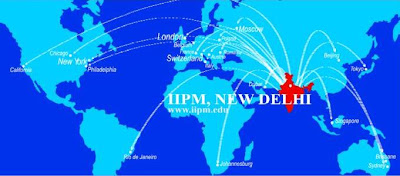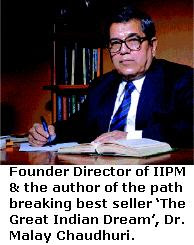IIPM Economy Review
The IIPM Think Tank Publications
Who We are?
The IIPM (The Indian Institute of Planning & Management) Think Tank, an independent, India-centric research body, is inspired by Dr. M.K. Chaudhuri’s vision of India as an economic powerhouse in the 21st century; a modern nation state where poverty becomes history and the underprivileged are not consigned to the dustbin of amnesia. The national presence (across seven nodes, New Delhi, Mumbai, Chennai, Pune, Bangalore, Hyderabad, and Ahmedabad) makes our understanding of the economy superior, where in many research fellows, visiting fellows, senior research associates, research associates, research assistants, program co-ordinators, IIPM faculty and etc. embark on research assignments and network with global intelligentsia.
Second Quarterly
The Marginalization of agriculture, Minimilization of industrial activity and Magnification of service sectors are three broad concerns that form the fulcrum of this particular issue. With its analysis and policy implications on broader patterns of these three sectors and some select specific ones like that of food processing, textiles, small-scale industries, tourism and etc. Agriculture, through decades has been grossly neglected. As a nation we have lost the potential of being the world’s ’Food Factory’. It is a strategic policy imperative to generate purchasing power to the fifty five percent of the population dependent on agricultural sector. This by itself would fuel the growth engine on a self sustaining basis. On the other hand we could not leverage the cost competitiveness of the manufacturing sector, as a nation, due to archaic labour policies and other repressive procedures. Moreover India Inc. critical success factor lies in an entrepreneurial class that is talented, gutsy and conversant. So it is urgent to create an enabling business environment which would enable these entrepreneur’s to churn out globally competitive products and services. Let the ‘Nuts and Bolts Revolt’……
Third Quarterly
Infrastructure is the very foundation on which a country’s industrial economy is built, while foreign trade and FDI are the modern day pillars that support it. We have grandiose ambitions about growing 8% annually, every year and becoming an economic giant, making foreign investment the only imperative. Yet we have attained notoriety among foreign investors for the tedious procedures, an apathetic bureaucracy, lacking infrastructure and unwarranted delays. Time has gone for policy makers to have realized ‘Foreign purse’ pectives’. Foreign investments not only act as a catalyst to sustainable growth but have tremendous positive ripple effects. It can also help to generate competencies with Indian manufacturing and thus lead us to become a trading powerhouse. The International Trade section features the highlights of the New Foreign Trade Policy, as a separate section, at last, for the convenience of the reader. The same has been dissected from an analytical point of view, incorporating the view points of sectoral experts and researchers. We believe India should unhesitatingly opt for ‘International Intercourse’ by reducing transactional costs. More than any investment, good infrastructure investment is a strategic key to bring out inherent strengths of any nation, making it work for growth, global competitiveness and poverty reduction. We believe that adequate attention to Inland Waterways and Rural Infrastructure can make a vital difference to the nation. Let there be no ‘Constricted Constructions’.
Annual Issue
India Economy Review 2004-2005 features scholarly research on the issues central to Indian politics, economics and management. This edition coalesce theoretical rigor and substantive information with policy significance, and serves as a thought-provoking academic forum for understanding contemporary developments in Indian economy pertaining education, health, poverty, unemployment, industry, agriculture, services, infrastructure, FDI, international trade and environment sectors. The main objective of this issue is to present a comprehensive, up-to-date and clear exposition of the issues and concerns that are essential for understanding, evaluating, and suggesting solutions to the important national economic problem, governance. It edition contains the thoughts, ideas, questions, cynicisms, answers and solutions of around 340 policy experts in the above mentioned sectors. It puts in perspective, for the casual observer and public, the ground realities of the Indian endeavor in all its dimensions and hues. It promises to usher in a potentially better, if not necessarily newer, dawn of economic policies that radiates the power to dispel the current darkness of socio economic and socio politic-al confusion.
For more info about IIPM, click below...
ARINDAM CHAUDHURI’S 4 REASONS WHY YOU SHOULD CHOOSE IIPM...
The Indian Institute of Planning and Management (I...
IIPM is A World of Career
IIPM : EDITORIAL & RESEARCH
IIPM Academics : Curriculum






